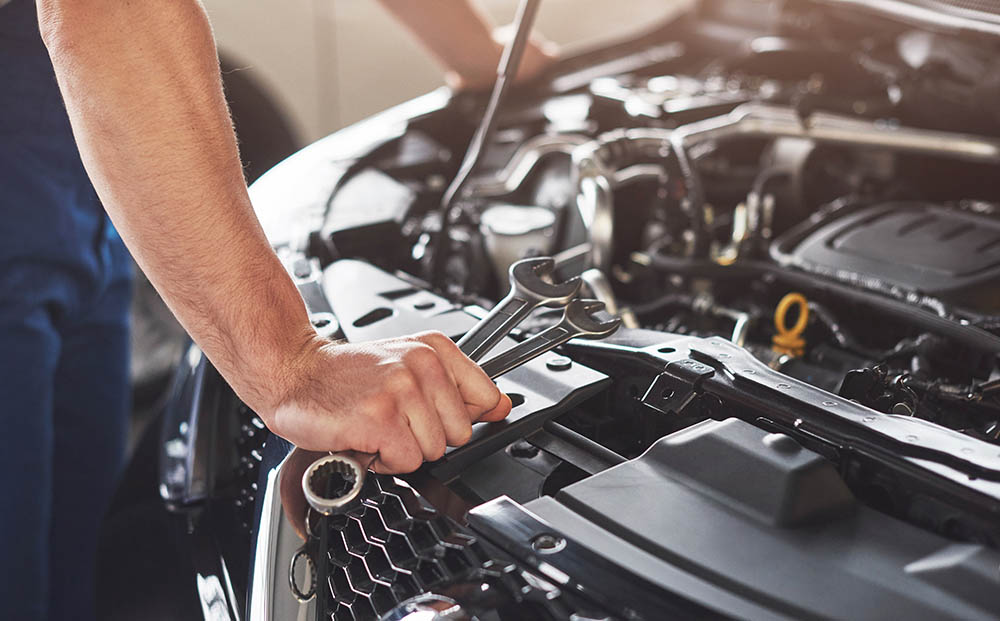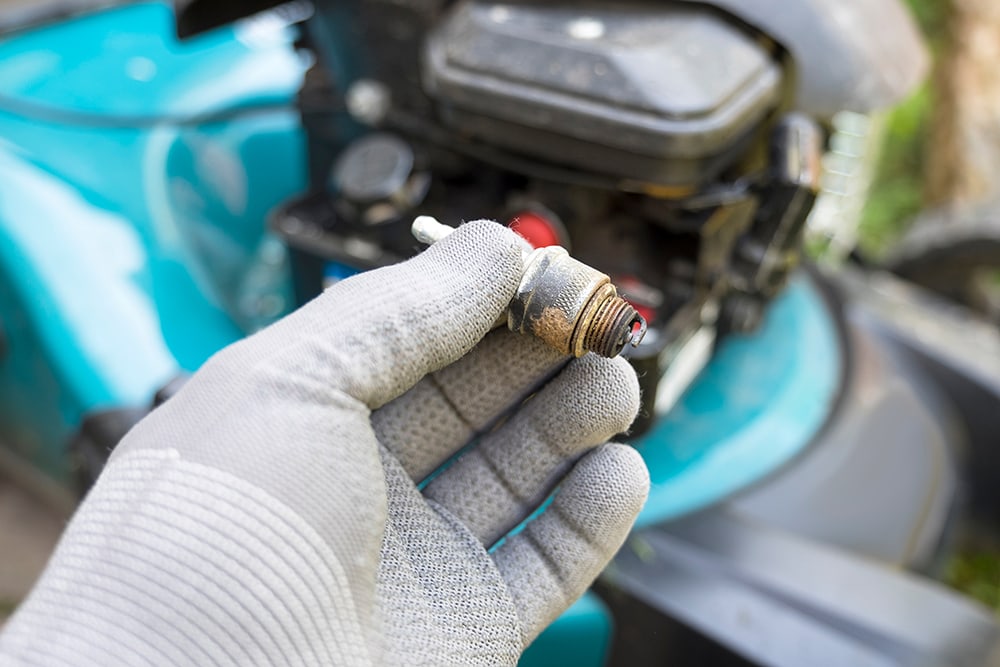What Is Engine Knocking? Causes, Facts & FAQ
-
Pete Ortiz
- Last updated:

With so many moving parts, weird car noises can pop up almost anywhere at any time. You can rarely shrug off a sudden rumble, pop, or whistle, and if it’s coming from under the hood, there’s plenty of reason for concern.
Engine knocking, often sounding like a pinging or tapping sound, indicates a combustion problem. It demands urgent attention and will likely cause severe and expensive engine damage if you allow it to persist. To ensure you take the proper steps to protect your car when trouble knocks, we’ll explain engine knocking and its common causes.
What Is Engine Knocking?
Engine knocking, sometimes called pinging or detonation knocking, occurs when the fuel/air mixture in a combustion chamber fails to ignite evenly or at the correct time. Multiple explosions happen in the cylinder, creating vibrations and a repetitive knocking noise that increases in volume and pace as you accelerate.
In a properly functioning 4-stroke cylinder, the spark plug ignites the fuel/air mixture at the end of the compression stroke when the pressure is high and power generation is maximized. A single flame front then expands across the cylinder and forces the piston out to efficiently turn the motor.
Sometimes, high pressure and heat will cause the fuel to ignite in pockets within the cylinder. Ignition can occur in two ways: spontaneous combustion following the spark plug ignition (“knocking”) or pre-ignition before the spark plug fires.
Spontaneous combustion after ignition can occur in random corners of the cylinder experiencing excessive heat or pressure. The outward expanding flame front from the spark plug and the compression of the piston force air into a corner, compressing/overheating it beyond its breaking point and causing it to detonate. The multiple flame fronts from this secondary explosion and the initial ignition expand simultaneously and create a shockwave when they collide, causing a sharp pinging or knocking sound.
Pre-ignition occurs before the spark plug ignites as the piston returns on the compression stroke. The fuel/air mixture reaches its ignition temperature early, causing it to explode without needing a spark.
Effects of Engine Knocking
An engine must work in a precise series of steps to function efficiently and slow degradation. Mistimed and multiple explosions go against the natural function of the cylinders and, if left unresolved, could cause engine damage.
- Overheated spark plugs
- Melted, cracked, or eroded pistons and cylinders
- Blown head gaskets
- Broken rods and bearings
Knocking and pre-ignition aren’t always noticeable at first, but they will get noisier as the explosions become more violent in the engine. Intensity can vary. Your vehicle may run for some time with a mild knock, while an aggressive knock might cause it to break down immediately.
No matter the severity, knocking means you’re losing engine performance and fuel economy and putting unnecessary wear on your vehicle.
Pistons rely on properly timed explosions to move. If the ignition doesn’t happen just before the piston reaches dead center near the end of the compression stroke, the flame front won’t reach it at the right angle, which will add stress or decrease efficiency. On the upward stroke, the resistance between the piston and the backward force of the explosion is one reason pre-ignition knocking is so damaging.
What Are the Different Causes of Engine Knocking?
The sudden, unexpected ignition in the combustion chamber that leads to engine knocking comes from too much heat or compression. Several issues can cause pressure or temperature to fluctuate, with some being much easier to fix than others.
Low Octane Fuel
It may be tempting to save at the pump by opting for a lower octane fuel, but using the wrong gas for your vehicle is a surefire way to inspire engine knocking. Octane numbers refer to the fuel’s stability under high pressure. The higher the octane, the better it can resist premature ignition.
High-end luxury and performance-tuned vehicles often need higher octane fuels. Turbochargers are a common source of engine knock, as they deliver more compressed air and subsequently higher temperatures to the cylinder, increasing the risk of an explosion.
If you suspect your engine is knocking because of low octane gas, check your vehicle’s manual or the inside of the gas filler door to find the specified octane rating. Some manufacturers offer “recommended” octane levels, meaning the car will work fine with regular gas but enjoy improved performance with higher octane fuel.
It’s crucial to follow the manufacturer’s recommended octane. Using lower octane fuel than your car needs can cause knocking and damage, but choosing a higher octane will often only be a waste of money. Higher octane means the fuel is more stable and less prone to ignition than less expensive gas. It typically doesn’t imply more power, better gas mileage, cleaner operation, or any other performance benefit.

Faulty Spark Plugs
A damaged, faulty, or improper spark plug can affect timing and temperature in a cylinder, causing fuel to ignite at the wrong time and create a knock. Installing the wrong type of spark plug is a common cause of this kind of engine knock, as is general wear and old age. Spark plugs need replacement every 80,000–100,000 miles. It’s crucial to change them as soon as they show signs of damage or fatigue.

Carbon Buildup in Combustion Components
Like soot in a chimney, carbon buildup results from incomplete fuel/air combustion. Many modern engines with direct fuel injection technology experience this because the cleaners in the fuel don’t always reach behind the valves and ports where carbon accumulates.
Carbon can cause knocking in several ways. As it begins to block valves and restrict airflow, carbon can negatively affect the fuel/air combination. If it disrupts the fuel flow and results in a lean mixture where there is too much air, it could slow the ignition and create a knock. Meanwhile, any foreign debris in a cylinder, carbon or otherwise, can clog the operation of the piston and valves.
Masses of carbon can also store heat efficiently, which creates pockets of excessively high temperatures in the cylinder, leading to knocking and reduced performance. At the same time, these buildups take up volume in the cylinder. The fuel/air mixture has less space to fill, thus increasing compression and raising the chance of pre-ignition.
Regular oil changes are crucial to prevent performance issues and breakdowns from excessive carbon buildup. Using higher-quality gas and fuel additives can also slow or halt the gradual accumulation that leads to engine wear.

Frequently Asked Questions
What Is a Knock Sensor?
The ECU in modern cars utilizes several safety mechanisms to monitor timing, fuel/air ratios, and other details to prevent performance problems. The most critical component in preventing engine knocks is a knock sensor.
A knock sensor is an accelerometer located on the engine that “listens” for engine vibrations indicative of knocking and alerts the ECU via a variable electrical signal. As the knock worsens, it can increase its voltage to relay the severity of the problem.
When the knock sensor detects an abnormal sound, the ECU will correct the issue by adjusting to a richer fuel/air ratio or, in most cases, delaying the spark plug ignition. By retiming the ignition, the flame front follows the piston on the power stroke, relieving the excessive pressure buildup in pockets of unburned fuel that causes secondary explosions.
How Do You Stop Engine Knocking?
Keeping a clean engine is one of the best ways to prevent engine knock. You can save time and effort on maintaining your engine with regular oil changes and high-quality gasoline at the proper octane. Doing so will prevent the carbon buildup, poor lubrication, and failed sensors that lead to mistimed ignition.
Regular tune-ups and spark plug replacements can also spare you from engine knocks. With basic annual maintenance, you can address many causes of engine knock before they arise.
If you’re already dealing with engine knock, there are several techniques you can use to stop it, including:
- Using a higher octane gas or octane boosting products
- Employing an oil or fuel additive to clear corrosion, debris, and carbon buildup
- Checking spark plugs for residue or corrosion and changing them as needed
- Performing a system scan to check the knock sensor and other engine monitors
- Cleaning the combustion chambers
- Testing and adjusting your engine’s timing
- Upgrading your engine cooling system to prevent overheating
The solutions to engine knocking can be quick and cheap, or they may require an expensive trip to the mechanic. As engine knock continues, it will degrade the pistons, cylinders, and other engine components, and it will only become harder to avoid costly and time-consuming breakdowns.
In Conclusion
Light engine knocking may not seem worth your attention at first, but appreciating the hidden damage behind those faint pops can save you from catastrophic engine failure down the line. Stay vigilant for unexpected engine noises, and keep on top of a rigid maintenance schedule. By following these tips, you’ll avoid expensive repairs and ensure a long, healthy life for your vehicle.
Featured Image Credit: Standret, Shutterstock
Contents




